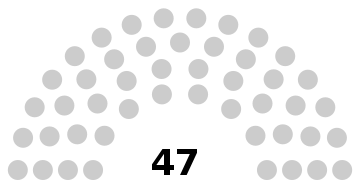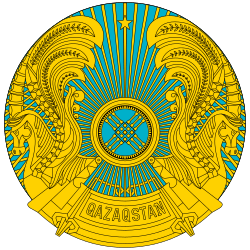Parliament of Kazakhstan
The Parliament of the Republic of Kazakhstan (Kazakh: Қазақстан Республикасының Парламенті, romanized: Qazaqstan Respýblıkasynyń Parlamenti; Russian: Парламент Республики Казахстан, tr. Parliament Respubliki Kazakhstan) is the bicameral legislature of Kazakhstan, according to the 1995 Constitution of Kazakhstan. The lower house is the Mazhilis, with 107 seats, (98 seats are from party lists, 9 – from Assembly of People) which are elected to four year terms. The upper house is the Senate, which has 47 members. As of January 2007, 10% of the parliament's representatives are women and 19% of local and city council officials are women.[1] Its predecessors were the Supreme Soviet of Kazakhstan 1991-1994 and Supreme Kenges 1994-1995.[2]
Parliament of the Republic of Kazakhstan | |
|---|---|
 | |
| Type | |
| Type | |
| Houses | Senate (upper) Mazhilis (lower) |
| History | |
| Founded | 1996 |
| Preceded by | Supreme Kenges |
| Leadership | |
Chairman of the Majilis | |
| Structure | |
| Seats | 154 members
|
 | |
Senate political groups | Government (47)
Non-partisan (47)
|
 | |
Mazhilis political groups | Government (84)
Pro-Government (9) Opposition (14) |
| Elections | |
| Indirectly elected by regional legislatures Appointment by the President | |
| Proportional representation Election by the Assembly of People of Kazakhstan | |
Mazhilis last election | 2016 Kazakh legislative election |
| Meeting place | |
 | |
| House of the Parliament, Nur-Sultan | |
| Website | |
| www | |
 |
|---|
| This article is part of a series on the politics and government of Kazakhstan |
|
|
|
Elections
Kazakhstan held elections to the Senate on 1 October 2014.[3] According to the Central Electoral Commission of Kazakhstan, it was "an open and democratic electoral process".[3] According to the OSCE, "Preparations for the 26 April election were efficiently administered, however, necessary reforms for holding genuine democratic elections still have to materialize. The predominant position of the incumbent and the lack of genuine opposition limited voter choice. A restricted media environment stifled public debate and freedom of expression.[4]
About 250 observers from the Commonwealth of Independent States and the Shanghai Cooperation Organization were present for the voting.[3] Four women were among the 80 candidates vying for the 16 open Senate seats.[3] The results were announced on 7 October 2014.[3]
The elections to the Mazhilis of the Parliament of the Republic of Kazakhstan of the Sixth Convocation took place on 20 March 2016. Six political parties attended the elections, three of them received more than 7% of the votes and passed to the Mazhilis of the Parliament. Those are the Nur Otan Party (82.20%), the Democratic Party of Kazakhstan “AK Zhol” (7.18%), the Communist People's Party of Kazakhstan (CPPK) (7.14%). The Nur Otan Party accounts for 84 deputies in the Mazhilis, the AK Zhol Party – 7 deputies, CPPK – 7 deputies, 9 deputies were elected from the Assembly of People of Kazakhstan and 43 deputies of the previous convocation passed to the Mazhilis of the Sixth Convocation. In general, the deputy composition was renewed by 60%. The new composition of the Mazhilis includes 78 (73%) men, 29 (27%) women. The average age of the deputies is 55 (as of 31 March 2016); Under 40 years old – 7 deputies; from 40 to 60 years old – 77 deputies; over 60 years – 23 deputies. 34 (32%) of deputies have PhD degrees. The deputies represent various spheres: public service, business, NGO, education, science, etc. The ethnic composition of the Mazhilis is as follows Kazakhs, Russians, Ukrainians, as well as representatives of Azerbaijani, Armenian, Dungan, Korean, Uzbek, Uyghur, Chechen and other ethnic groups.
See also
References
- Kazakhstan: Presidential adviser spells out advances by women RadioFreeEurope/RadioLiberty
- https://books.google.fi/books?id=l_KQAgAAQBAJ
- "Kazakhstan holds Senate elections "without incident"". Fox News Latino.
- "OSCE ELECTION OBSERVATION MISSION Republic of Kazakhstan – Early Presidential Election , 2 April 2015 STATEMENT OF PRELIMINARY FINDINGS AND CONCLUSIONS". Retrieved 15 March 2016.